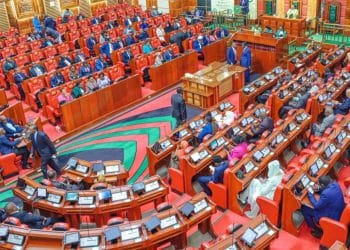Kenya MPs approve immunity bill, a controversial move to shield themselves and Members of County Assemblies (MCAs) from prosecution for actions taken in good faith, as reported by Nation.Africa.
The Constitution of Kenya (Amendment) Bill, passed with a 242-5 vote in the National Assembly, grants legislators broad protection from legal action, raising concerns about accountability in Kenya’s governance.
This MP’s shield prosecution measure, awaiting Senate approval, could significantly alter the balance of power by limiting judicial oversight over parliamentary decisions.
Sponsored by Homa Bay Town MP Peter Kaluma, the bill amends the Constitution to ensure MPs and MCAs face no legal consequences for actions performed in their official capacities, provided they are done in good faith.
The legislation builds on the Parliamentary Powers and Privileges Act, which already protects lawmakers from prosecution for statements made in the House.
However, this new law extends immunity to actions outside parliamentary sessions, potentially covering decisions made in committees or public engagements.
Critics argue it risks creating a culture of impunity, while supporters, like Kiharu MP Ndindi Nyoro, claim it safeguards legislators acting in the public interest from frivolous lawsuits.
The vote, which required a two-thirds majority (233 members), saw overwhelming support across political factions, with only five MPs opposing it.

If the Senate concurs and President William Ruto signs it into law, the judiciary will be barred from interfering in matters before the National Assembly, Senate, or county assemblies, a move some fear could undermine Kenya’s separation of powers doctrine.
Public reaction has been polarised, with some users praising the MPs’ shield prosecution bill for protecting lawmakers from legal harassment, while others label it a self-serving attempt to evade accountability.
Posts highlight concerns about past incidents, such as MPs facing suits for actions like raiding alcohol dens on public orders, which Kabando wa Kabando (Mukurwe-ini) cited as justification for the amendment.
The bill’s timing is notable, following recent tensions between Parliament and the Judiciary, including court orders delaying government projects like the Housing Fund and Finance Bill 2023.
President Ruto has previously accused judges of colluding with opposition figures to block initiatives, a sentiment echoed by some MPs who argue courts overstep into legislative affairs.
The Justice and Legal Affairs Committee, chaired by Tharaka MP George Murugara, rejected counter-proposals to enforce court order compliance, citing risks to parliamentary independence.
This development comes amid broader legislative activity, including the recent passage of the County Allocation of Revenue Bill 2025, which bolsters devolution funding.
However, the shield prosecution bill has overshadowed these efforts, drawing scrutiny for its potential to weaken checks and balances. Legal experts warn that without clear definitions of good faith, the law could be abused, allowing lawmakers to sidestep accountability for corruption or mismanagement.
As the bill heads to the Senate, debates intensify over its implications for Kenya’s democracy. The Kenya MPs’ approval immunity bill could embolden legislators but risks eroding public trust in governance, especially given recent criticisms of Parliament’s insularity, as noted on social media about its disconnect from citizens’ struggles.
The MPs’ shield prosecution measure has sparked calls for public participation in the Senate’s review process to ensure transparency. Civil society groups are mobilising to challenge the bill, arguing it contradicts the 2010 Constitution’s emphasis on accountability.
The outcome will test Kenya’s commitment to balancing legislative autonomy with judicial oversight. Kenya MPs approve immunity bill, while aimed at protecting lawmakers’ functions, raises critical questions about unchecked power.
As the MPs shield prosecution law awaits Senate deliberation, stakeholders urge vigilance to prevent potential abuses, ensuring Kenya’s democratic principles remain intact.

















